Press Reviews
November 2021
International Media Digest
SERBIA SIGNS DEAL FOR GAS WITH MOSCOW, MULLS BUILDING NPP WITH RUSSIAN HELP
While Europe is grappling with increasing costs for energy, Serbia used its peculiar historical and political links to Russia to keep current gas prices stable for another six months, in an exclusive deal that reinforces the Russian influence in a country already completely dependent on Moscow for energy supplies.
Moscow accepted to keep the gas price for Serbia at $270 (237 euros) per 1.000 cubic meters for another six months. Afterwards, Belgrade will receive favourable terms on a long-term contract, Serbian President Aleksandar Vucic and Vladimir Putin agreed in November. The Russian President “understands how important the issue of gas supplies is, as we need around 13 million cubic meters of gas by the end of February, and 4-5 million cubic meters in May-June, (he) demonstrated exceptional friendship to Serbia,” Vucic said after the meeting. The Serbian leader noted that “we saved over 300 million euros thanks to the friendship of President Putin, we saved money for one national stadium,” the news agency TASS reported.
Earlier this year, Serbia launched a new pipeline from Turkey and Bulgaria to bring more Russian gas into the country and towards Hungary and possibly Bosnia and Herzegovina. Bosnia and Herzegovina, North Macedonia, Moldova, and Serbia and Bulgaria have the highest degree of dependency from Russia for gas supplies, reaching 90-100% in 2020.
Serbia, a candidate for EU membership but with strong strategic relations both with Russia and China, is also focusing on the diversification of energy production, again by involving Moscow, Vucic suggested this month.
For the first time, the Serbian President mentioned the possibility of Belgrade constructing its nuclear power plant. “Now we are considering the issue of nuclear power plants,” Vucic revealed during an interview with a Russian journalist posted on YouTube. “Once we secure reserves and new facilities from renewable sources we will look into nuclear plants,” he said in November. However, the main issue are the costs, estimated at ten billion euros, a sum that could bring the national debt over 60% of GDP, a limit established by the Serbian Constitution. At the same time Vucic has proposed to Hungary a 15% minority stake in its new Nuclear Power Plant.
According to Vucic, talks are already ongoing with the Russian giant Rosatom about the possibility of Moscow contributing to the realization of a Serbian nuclear power plant. “Serbia is in talks with Rosatom on the next steps,” Vucic said, evoking the scenario of even stronger cooperation between Serbian and Russia and, indirectly, of an even more increased influence of Moscow in the country.
A new study confirmed that Serbia is already the most susceptible to Russian and Chinees influence among the countries in the region, together with neighbouring Hungary, which is investing approximately 10 billion euros in the construction of the Paks II nuclear power plant through a Russian loan and technology from Moscow. The study, produced by the Globsec Policy Institute, shows that Serbia is the most exposed to Russian and Chinese influence in Central Europe and the Western Balkans, with 66 points on a 0-100 scale, where 0 indicates the countries the least exposed, 100 those the most exposed to their influence. The second place in the list is held by Hungary with 43 points, and the third by Bulgaria with 36 points.
The report claims that Serbia is pervaded by growing Chinese and Russian influence, reinforced by the stalled European integration process. This attitude permeates the entire society “regardless of age, education or place of residence,” the report said. “Attachments to Russia, pervasive throughout the country, are buoyed by cultural, religious and historical connections between the two nations,” the study reads, noting that the level of attachment of Serbs to Russia is “alarming.” “Favourable attitudes towards” Moscow and Beijing “are motivated by presumed economic benefits and steered by intensive PR campaigns” carried out by the Serbian and Russian political leadership.
THE FUTURE GOVERNMENT IN BULGARIA WILL NOT LIFT THE VETO AGAINST SKOPJE SOON
After the third general elections in a year, Bulgaria is finally bound to have a new political government by December. However, members of the future coalition anticipated they will not lift soon the veto on North Macedonia’s negotiations with the EU, which is undermining Skopje’s aspirations to join the block.
After elections in April and July had failed to produce a government, at the new general election of November 14 the newly-founded centrist and pro-European party “We Continue the Change” (PP) prevailed with 25,6 per cent of the votes over the GERB of former populist conservative Prime Minister Boyko Borissov, which gained only 22,7 per cent.
The PP party was created in September by Kiril Petkov and Asen Vasilev, two politicians and former entrepreneurs educated at Harvard. PP leaders said that they would never enter a coalition agreement with GERB and the MRF party, the second being focused on the Turkish minority (13 per cent), two parties marred by scandals and corruption allegations and accused by their critics and opponents of being responsible for the prolonged political crisis in the country. On the contrary, Bulgaria’s future ruling coalition, dubbed the “parties of change,” could include the PP, the “There is such a people” (ITN) party of the showman Slavi Trifonov, “Democratic Bulgaria” (right-wing) and the Bulgarian Socialist Party (BSP).
The so-called parties of change will not however reshape the current Bulgarian policy against neighbouring North Macedonia – one of the key issues at this stage – any time soon. Bulgaria is disputing the origin of the Macedonian language, defining it as a Bulgarian dialect. Another source of dispute are certain historical figures which both Sofia and Skopje claim as their own. Moreover, Sofia said that Skopje should give up alleged territorial, minority and historical claims to Bulgaria before starting accession negotiations.
The future government coalition agreed to maintain a “unified Bulgarian position” towards Skopje, promising to “upgrade dialogue in a constructive spirit”, but not lifting the veto for now, the four parties said. In this way the members of the future coalition met the demands of the Bulgarians Socialist Party, currently the most vocal opponent against compromises with North Macedonia. However, the BPS suggested it might revise the demands to Skopje in the future, making an agreement with North Macedonia possible.
In general, the future coalition could push for broader talks with North Macedonia through bilateral committees, solving step by step all open issues between the two countries. “We want to show change not in words but in activity. We really want to achieve results, to see that the work between the two countries has begun,” said Kiril Petkov (PP), which will be likely given the mandate to form the new government by the Bulgarian President Rumen Radev. Radev was re-elected as chief of state after winning presidential elections in November. For now, however, the Bulgarian position remains unchanged, the Bulgarian ambassador to the EU Rumen Alexandrov told the General Affairs Council in Brussel, adding that only “Albania should be appraised on its own merits, and it is ready to make headway on its way to the EU.”
Reaching an agreement between Bulgaria and North Macedonia for lifting the veto could therefore take weeks and might not be reached by the end of the year, as Skopje expected. The situation is made even more complicated by the ongoing political crisis in North Macedonia, caused by the poor results of the ruling Social Democratic Party in the local elections in October, followed by the decision of Prime Minister Zoran Zaev to announce his resignation. Analysts said the defeat of Zaev’s party at the elections might be also attributed to the failure of the EU to open negotiations with Skopje due to Bulgaria’s blockade.
Further News and Views
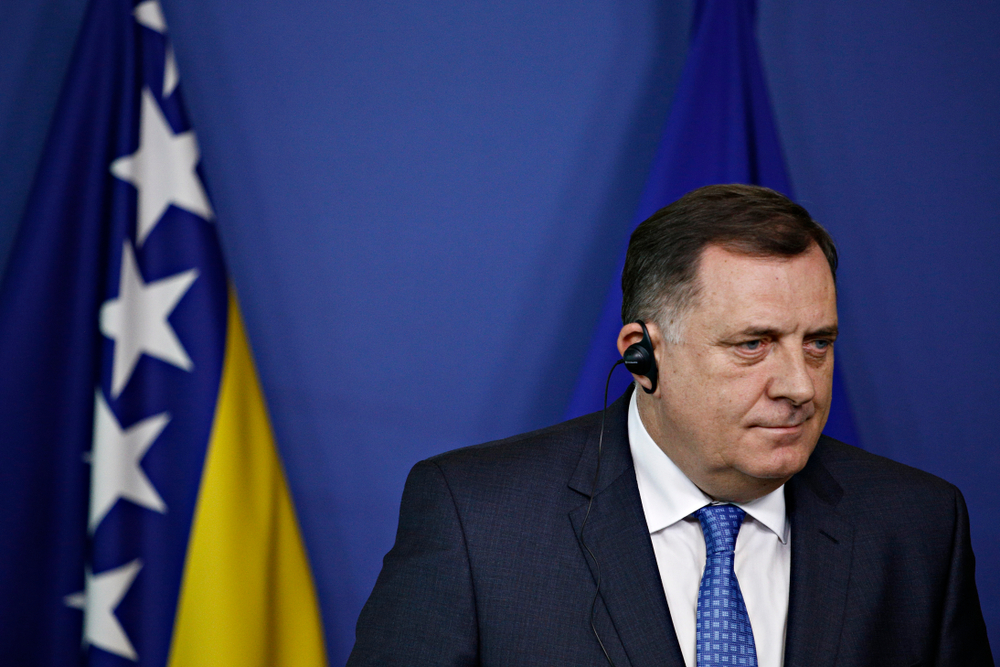
Bosnia still heading for crisis, Dodik threatened with sanctions
Bosnia and Herzegovina remained engulfed in its greatest political crisis since the end of the war, with no positive breakthrough reached despite the increasing foreign involvement in the country. The main architect of the crisis, the Bosnian Serb leader Milorad Dodik, currently the Serbian member in Bosnia’s tripartite presidency, confirmed he would not be discouraged by international sanctions to pursue his plans of stripping the central Bosnian institutions from mayor competencies.
Members of the European Parliament urged recently the EU to impose sanctions against Dodik. Meanwhile, Germany asked the EU’s European External Action Service (EEAS) to draft a proposal for introducing financial sanctions against high officials in Republika Srpska who “seriously endanger the security situation” or undermine the Dayton peace accords,” Radio Free Europe reported, quoting unnamed diplomatic sources in Brussels.
The United States may also impose sanctions against entities and political figures that try to destabilize the peace deal and the constitutional structures in Bosnia and Herzegovina, Secretary of State Antony Blinken said this month. “We are concerned about the increased tensions we see. Therefore, we welcome that the NATO and European Union are working very closely together in the region, both in Kosovo but also in Bosnia and Herzegovina,” NATO Secretary-General Jens Stoltenberg said.
Dodik, however, said he is expected to have the support of Russia and China in case of international sanctions. A session of the Parliament of Republika Srpska, where Bosnian Serbs MPs are expected to give green light for the overtaking of powers from the central Bosnian state, could be scheduled between December 8 and December 10. The European Union Force in BiH (Operation Althea) is still overseeing the military implementation of the Dayton Peace Agreement after its mandate was extended by the UN Security Council at the beginning of November.
N1 Television, Radio Free Europe (1), Radio Free Europe (2), The Guardian
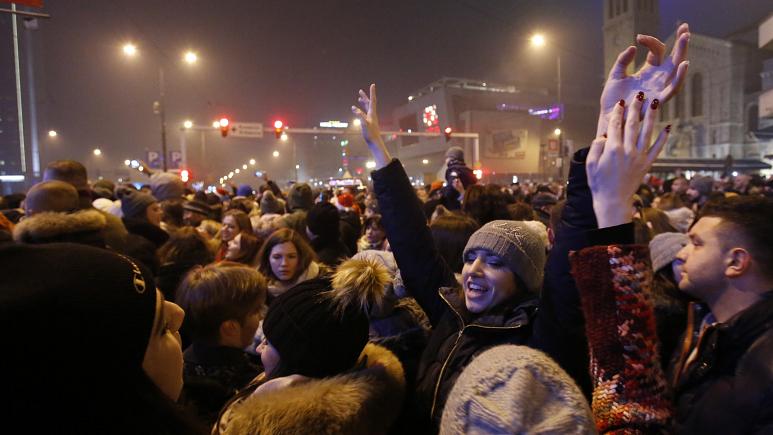
Almost half of the young planning to leave Bosnia and Herzegovina
Nearly one in two young people in Bosnia and Herzegovina are planning to emigrate temporarily or permanently from the Balkan country, according to a new study of the United Nations Population Fund (UNFPA). Emigration, combined with a low natality rate, is a major issue in the whole of Central and Eastern Europe, a region observing a dramatic population drop since years. The “Survey on Youth Emigration” showed that dissatisfaction with the life quality is the main driver of young people’s interest in going abroad, followed by lack of quality public services, a non-supportive environment and a lack of job opportunities, UNFPA said. According to UN estimates, Bosnia’s population could drop to 1,6 million by 2050 from 3,5 million today.
UNFPA
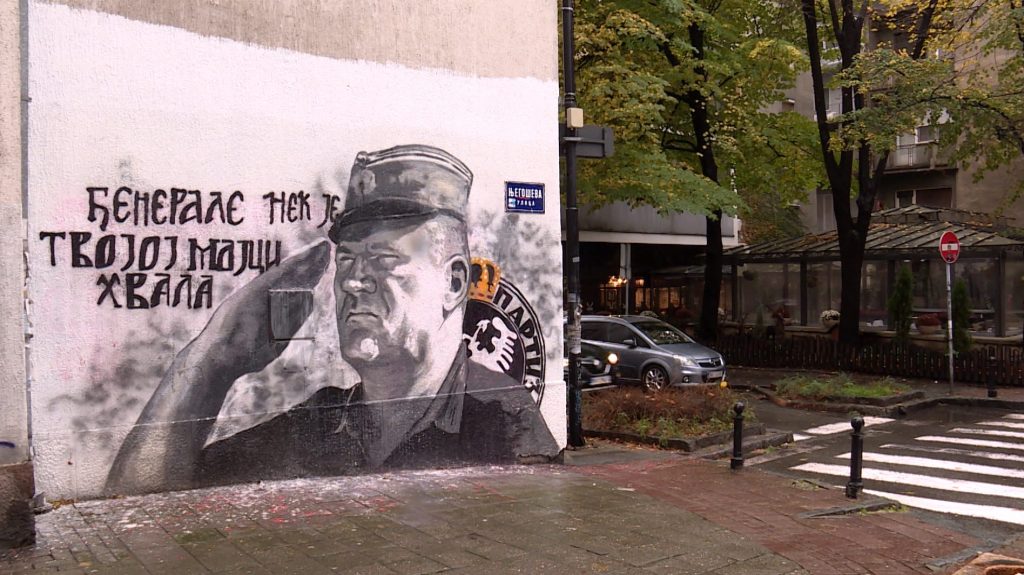
Belgrade shaken by ‘graffiti war’ over Mladic mural
Serbian police were deployed in Belgrade several times in November to prevent human rights activists from painting over a large mural of convicted war criminal Ratko Mladic, sentenced also for the genocide in Srebrenica. The mural was painted by unknown ultranationalists in the Serbian capital in July and local activists decided to remove it this month. However, the authorities, citing possible clashes between them and right-wing nationalists, forbade them to carry out the action, causing controversies. Belgrade has repeatedly denied that a genocide was committed in Srebrenica but only serious war crimes, a stance that has provoked tensions with Bosnia and Herzegovina and with the international community.
The Associated Press, Balkan Insight, Euronews
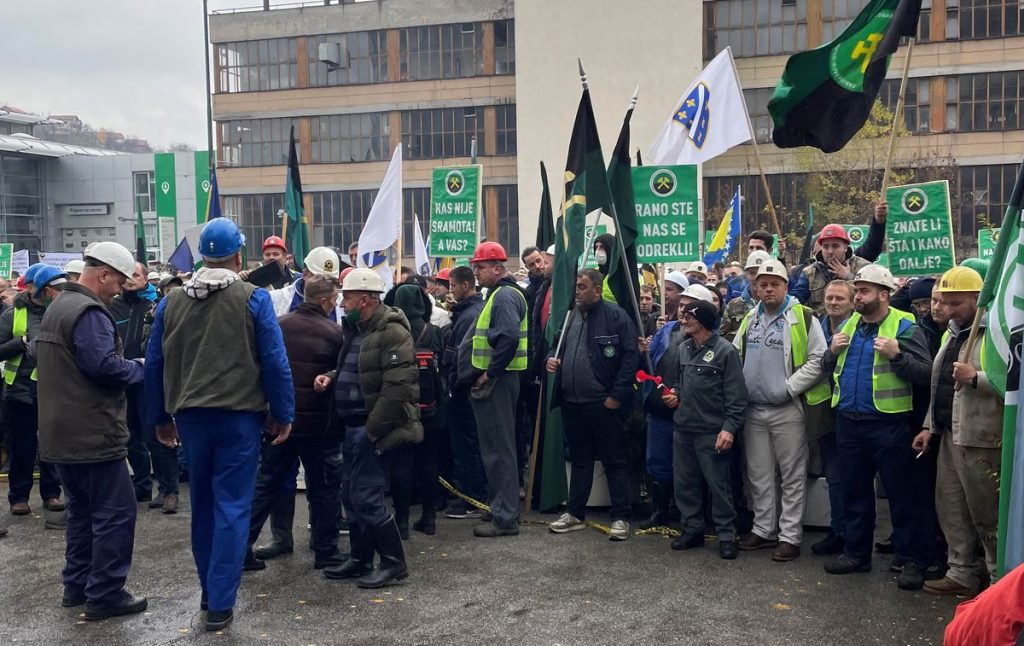
Miners’ protest shakes Bosnia
Thousands of miners protested in Sarajevo at the end of November against possible closures of coal mines in the country and for better salaries. Bosnia, which is largely dependent on coal to produce electricity, announced plans to decarbonise the energy system by 2050. The state-owned Elektroprivreda BiH power company, which employs about 7.000 workers, has already announced a restructuring plan that foresees the retirement of 419 miners already this year. Elektroprivreda recently decided to slash the basic wage for miners, provoking their rage. After two days of protests in Sarajevo, the miners announced that they will stop extracting lignite, forcing Elektroprivreda to switch off two units temporarily due to a lack of coal.
Radio Free Europe, Euractiv, Bne Intellinews
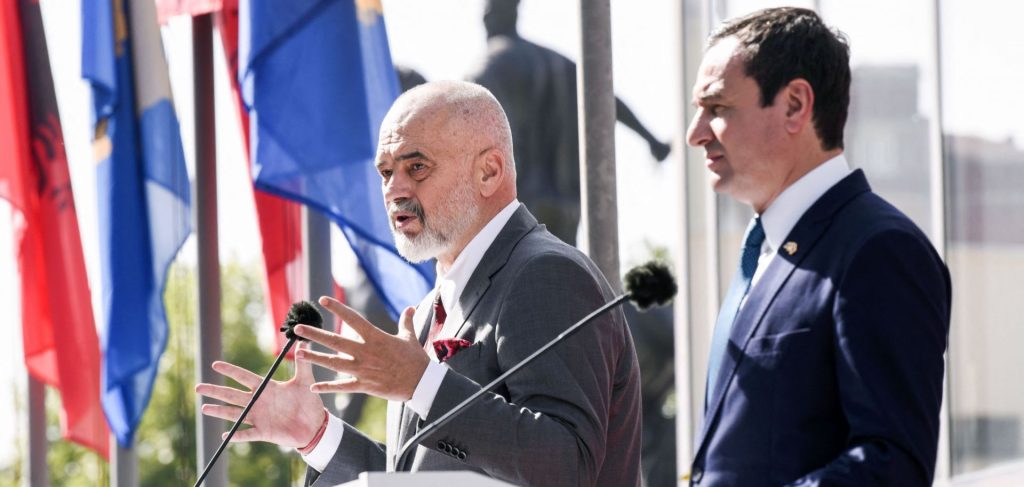
Kosovo and Albania’s PMs in favour of unification
Both Albanian and Kosovo Prime Ministers said they would vote in favour of the unification of Kosovo and Albania in a referendum, causing rage and concerns in Serbia. “If they ask me about the hypothesis of a possible peaceful referendum on the unification of Albania and Kosovo, I would (…) say that I would vote in favour of it,” Tirana’s Prime Minister Rama said, adding that “this will happen one day.” Previously, also PM Kurti said he would vote for unification with Albania if such a referendum is conducted peacefully and democratically. Kurti’s statements are “another stone in undermining the foundations of regional stability and security,” Serbian Prime Minister Ana Brnabic replied, while the positions of Rama were condemned by President Vucic.
Euronews Albania, Exit
Monthly Analysis
SERBIA SHAKEN BY NEW ENVIRONMENTAL
AND ANTI-GOVERNMENT PROTESTS,
GROWING RISKS OF DESTABILISATION
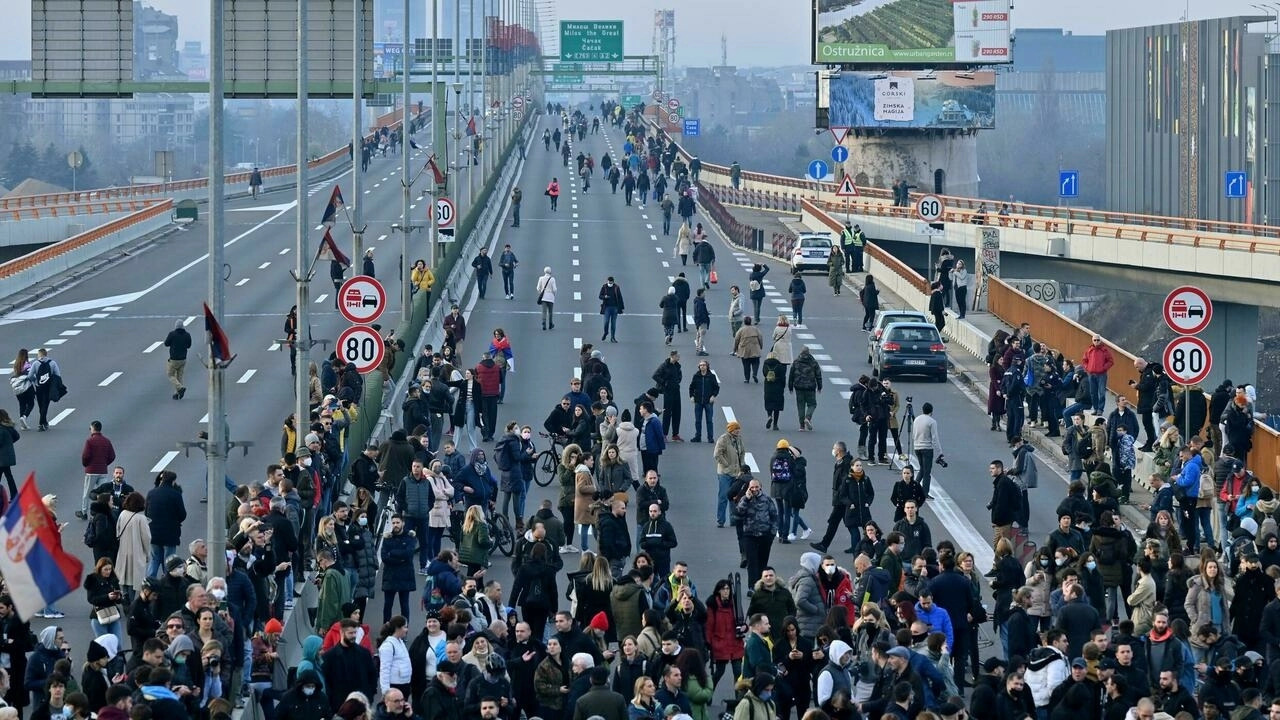
One of the most significant lithium mining projects globally, strongly supported by the government in Belgrade, might be leading Serbia, one of the key countries in the Balkans, towards a significant period of destabilization and turmoil. Street protests were already held in the country in November and new demonstrations are planned for December.
Environmental organizations, civil society groups, activists and opposition parties are protesting against a major investment of the mining giant Rio Tinto near Loznica, in western Serbia. Rio Tinto, a mining company with a reputation for causing serious environmental damage in different parts of the world, is planning to invest more than two billion euros in the so-called “Jadar Project” in Serbia. The project is named after “jadarite”, a mineral Rio Tinto discovered in Serbia in 2004.
According to the company, Jadar would produce battery-grade lithium carbonate, crucial for producing batteries for electric vehicles and storing renewable energy, and borates, increasingly needed for wind turbines and solar panels. The Jadar project is expected to become operative by 2026, subject to receiving all relevant state approvals, environmental permits and licenses. The development would include the realization of an underground mine that would produce 58.000 tonnes of lithium carbonate, 160.000 tonnes of boric acid and 255.000 tonnes of sodium sulphate. The company said the project would create thousands of jobs both during construction and during the exploitation of the future mine, one of the largest planned in Europe. “We are committed to upholding the highest environmental standards and building sustainable futures for the communities we operate in,” Rio Tinto assured.
However, experts and environmental activists in Serbia claim that the Jadar mine will destroy farmland, animal life and precious rivers, without significantly contributing to the economic development of the country. The Jadar project could negatively affect the lives of more than 19.000 people in the Loznica area only and destroy highly fertile land, they said. A massive toxic tailing is also planned in the valley between the Jadar and the Korenita rivers, allegedly putting at risk the basins of Drina and Sava rivers, from which about 2,5 million people in Serbia are supplied with water.
While Rio Tinto is waiting for the final necessary authorisations for the mine and ore processing, the Parliament in Belgrade adopted two controversial laws on expropriation and referendum reform, condemned by activists and the opposition in Serbia. The law on referendum could hamper popular initiatives by establishing high administrative fees for a consultation, critics said. Serbian President Aleksandar Vucic and the government said they would organize a referendum on the Jadar project. The new expropriation law could allow the mandatory acquisition of private land by the state within only eight days. The opposition in Serbia argued that the laws will pave the way for Rio Tinto and other foreign mining companies, for instance, the Chinese Zijin copper miner, to circumvent popular discontent and to carry out projects more quickly and with fewer controls by the state.
To protest against the laws and the Rio Tinto project several thousand demonstrators, including anti-government protesters, went to the street simultaneously in Belgrade, halting traffic on the most important Serbian highway, in Novi Sad and other smaller towns on November 27 in what they say was just a “warning blockade”. They managed to stop traffic on main bridges and roads for one hour. At the roadblocks there were scuffles with the police, while activists claimed supporters of the Serbian Progressive Party (SNS) of President Vucic violently attacked them in the city of Sabac. Several people were detained by the police, in one of the tensest days Serbia witnessed in years.
The environmental protests in Serbia may escalate in December, with the organizers of the first blockade claiming that it was just the beginning of more massive demonstrations that could bring Serbia to a halt. “We promised to block roads again if President Aleksandar Vucic signed the law on referendums and we are calling the Serbian public to join us. This time the roadblocks will be in place for more than an hour and in more places in Serbia,” the Alliance of Ecological Organizations of Serbia (SEOS) warned, confirming a new blockade for December 4. Demonstrators want the government to rethink the new laws on referendums and expropriation and to reconsider the Jadar project. The authorities said the protests are political.
If the new demonstrations turn violent again, they might cause further tensions and turmoil and even lead towards a significant destabilization of the country, ahead of the 2022 elections.
The Insight Angle

SRECKO LATAL
Editor at the Balkan Investigative Reporting Network,
Latal covered Bosnia and Herzegovina for The Associated Press during the 1992-95 war. He is a former analyst for the International Crisis Group.
A serious crisis is unfolding in Bosnia and Herzegovina, with Bosnian Serb leader Milorad Dodik threatening to withdraw Republika Srpska from major state institutions, including the army. Do you think there is a real risk of the country breaking up?
Yes, 26 years after its Dayton peace accord, Bosnia and Herzegovina (BiH) is today facing a major risk of breaking down, which could happen if Bosnian Serb leader Milorad Dodik delivers on his promise to push through his plan for the return to the “original Dayton.” Such unilateral move, attempted outside of state institutions and legal regulations, would effectively amount to a legal, if (still) not territorial secession of the Serb-dominated entity of Republika Srpska from the rest of the country.
Any unilateral attempt of secession would mean the final collapse of the Dayton peace accord and could lead to a new ethnic conflict(s). Given the divergent, even conflicting stakes and positions of regional and global actors in Bosnia, new violence in Bosnia could in turn draw in the rest of the region – primarily Serbia and possibly also Croatia – and at some later stage also potentially some foreign actors, such as NATO, Russia, Turkey, and/or other Islamic countries.
This is why the current situation in Bosnia and Herzegovina is by far the biggest and most serious crisis this country has witnessed since the end of its 1992-95 war, and should be observed as a potential threat for the security of the entire region, and even all of Europe.
Dodik claims he has Russia’s backing, Jansa and Orban met with the Bosnian Serb leader recently, showing support to Dodik, while Erdogan said Turkey will defend the “well-being” of Bosnia. What is the role of foreign powers in the current crisis in Bosnia?
The gradual disappearance of the EU enlargement perspective for the Balkans, as well as shifts in the US foreign policy vis-à-vis this region, have created a power vacuum in the past decade, which was used by other regional and global actors to establish or re-establish their influences here.
All of these external actors – from Belgrade and Zagreb, to the USA, the EU and all the way to Russia, Turkey, China and others – have their own stake in Bosnia and Herzegovina. Yet it also seems that none of them has true strategic interest, beyond the one to use Bosnia and the rest of the Balkans as a chip – or a trump card – in their internal or external politics.
In other words, some of these external actors want to see Bosnia and Balkans stable and quiet, so that they can go about their business elsewhere, while some others do not seem to mind stirring tensions and even possibly allowing limited conflicts, apparently hoping to benefit from it one way or the other. Some of these actors support Bosnian Serb nationalist and separatist ideas, others side with Bosnian Croat autonomist initiatives, or with Bosniak nationalist dreams of dominating other ethnic groups in the country.
Unfortunately, few external actors seem to really care what people of Bosnia and other Balkan countries really need, and that is long-term stability, which can be obtained only through some kind of internal compromise and relevant and concrete EU perspective.
North Macedonia, Bulgaria and Romania – and of course Bosnia – are also witnessing significant political crises currently. Do you think the Western Balkans and Southeast Europe in general are heading towards a period of turmoil and destabilisation?
We are definitively witnessing a wave of political crisis flowing across South East Europe, but it is only a part of a global multidimensional crisis, which has been developing in recent years. A major part of the world today seems to be suffering from the pandemic of bad politics, which includes self-centred, autocratic, populist, nationalist and/or corrupt policies. These bad policies, in combination with the endless drive for profit have been causing worsening climate changes, deepening economic and social inequities as well as increased political, religious, racial and ethnic tensions across the globe.
The crisis in South East Europe can be properly understood only if we put it into a larger context of this global pandemic of backsliding democracy, because then we can understand that people in Albania, Serbia, Bulgaria or Poland do not opt for conservative, populist and/or autocratic politicians only because of their own retrograde views. They do it because they see the same trends in the nations once considered beacons of progressive ideas. Let’s recall the UK’s Brexit vote, which used data from social networks to manipulate voters, or the victory of Donald Trump in US presidential elections in 2016, which was based almost entirely on empty promises and populist rhetoric.
Most importantly, the crisis in South-eastern Europe is directly connected to the existential crisis in which the EU finds itself today. I believe that many people in the EU do not understand that Hungary and Poland’s disrespect towards key EU principles is not the cause but one of the first consequences of EU’s internal crisis. The fact is that all main EU member countries, from Germany to France and others, have pulled out almost all political power from EU institutions, reducing the EU to the position of a common market – something that is still crucially important for all of them. Yet EU member countries still seem to expect from EU institutions to carry through projects that require significant political power and authority, such as the enlargement process. This duplicity is undermining the very foundations of the EU, and is weakening its position in South-eastern Europe, as well as everywhere else.
After the turmoil in the north of Kosovo, Belgrade and Pristina do not show any sign of willingness to go back to the EU-facilitated dialogue in Brussels. Kurti lost local elections recently, Serbia is heading towards general elections next year. Is there any chance of a breakthrough in negotiations between Serbia and Kosovo in the near future?
Unfortunately, I see no chance for Belgrade-Pristina rapprochement for many years to come, and I do not understand why the US and EU still continue pushing Serbia and Kosovo into the dialogue, which neither side really wants. The breakup of the Serbia-Kosovo dialogue, just like the institutional crisis in BiH, or recent religious, ethnic and political tensions in Montenegro, all have one common denominator, and that is the collapse of EU’s enlargement perspective for the Balkans.
Let me remind you: a decade ago Serbian and Kosovo leaders were promised EU membership – or at least its near proximity – in exchange for gradually restoring their relations. But then one day, it became clear that the bounty was not on the table anymore, yet the US and EU still expected Belgrade and Pristina to live up to their side of the bargain.
The same thing happened with Kosovo’s visa-free regime, or with Albania and North Macedonia’s start of accession process. EU set some very difficult criteria, but even after the European Commission officially confirmed these criteria met, EU member countries failed to deliver on their promise. Today, the EU is calling for some other difficult reforms, and is promising billions of euros in return, but Balkan leaders do not trust the EU anymore and are seeking alliances with other actors, be it the USA, or Russia, China or Turkey.
What kind of negative consequences the stalled EU integration process is having on the Balkans?
So far, the EU has been mainly observing this issue from its usual bureaucratic and technocratic perspective, warning that stalled integration process would lead to further economic and social inequity between the EU and Balkan countries. Unfortunately, the EU never established itself as a political actor, and never understood critically important political and security aspects of the enlargement. Namely, after the breakup of former Yugoslavia, many people across the region preferred to live within the same borders with their ethnic kin.
Only the EU was able to offer such broad borders that would have helped to put Balkan ethnic fears aside. But with the EU perspective all but gone, and with the escalation of regional and global tensions, some of the ethnic leaders in the Balkans once again promote unilateral separatist, secessionist or centralist ideas, similar to those that pushed the region into a series of bloody wars in 1990.
Unfortunately, both local and international actors in the Balkans seem to be forgetting their own mistakes and painful lessons from the recent past, and are slowly slipping back into 90’s.

Stefano Giantin
Journalist based in the Balkans since 2005, he covers Central- and Eastern Europe for a wide range of media outlets, including the Italian national news agency ANSA, and the dailies La Stampa and Il Piccolo.

